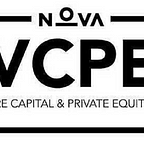Private Equity is booming and Hedge Funds want a piece of the pie
Traditionally, the world of investing has been divided into two territories: private and public equity. The conventional path of a company starts with money from Venture Capital firms (VCs) or angel investors. As the company matures, growth equity or late-stage VCs come into play. Eventually, the majority of firms, which grew significantly, end up going public and supposedly is only here that Hedge Funds (HFs) join the party. But the lines separating these asset classes have begun to blur.
With so many startups emerging lately, we have seen rising interest from HFs in the VC space, with the former having become more and more active in this market. And it ends up being the natural course to move away from the retail investor, after all, that is where most likely the best arbitrage opportunities are going to be. In the past years, VCs have outperformed every other major asset class, and this is maybe why Venture Capital firms have been getting too comfortable. Moreover, according to ARK Invest, private equity valuations have soared in comparison to public markets, with median multiples on late-stage private companies increasing by almost 300% on average between funding rounds, while the Nasdaq saw a decline of 8% during the last year as of June 2022. No doubt money is flowing from one side to another. In reality, assets in private capital rose from $2T in 2010 to more than $7T at the end of 2020 according to Morgan Stanley, while the Hedge Fund industry has “only” grown from $1.9T to $3.6T in the same time frame.
Hedge funds are indeed developing separate and focused funds with longer investor lock-ups to enter this space, and if one thinks about it, it is actually a no-brainer to do it. Not only do Hedge Funds have access to more investment opportunities by having access to both markets, public and private, but also get a glimpse of both sides of the picture as a whole. Moreover, even though public companies disclose more figures in order to comply with the same reporting rules, there is a lot more asymmetric and insider information in the private markets, which helps HFs make even better investment decisions. Lastly, sometimes they just do it as a means of entering earlier in overcrowded IPOs, catching the valuation at fraction of the price.
Nevertheless, VCs are specialized in picking up startups and don’t fool yourself: they are good at doing so. Sequoia, a famous VC fund, which has been around since 1972, invested in companies such as Google, Apple, and LinkedIn, before they became the massive businesses they are today. In fact, since their inception, they have backed companies that are now worth together more than $3.3T. To put that into perspective, that is bigger than the entire GDP of the UK. It is somehow indisputable that they know what they are doing, so how did Hedge Funds learn to compete with them? Although they have less experience in the private markets, many lessons from the public ones can be applied on this side. On top of that, HFs are known to have some of the brightest “quant” people in the world, so how difficult can it be to analyze a startup pitch deck? Ultimately, it all comes down to winning the deal and VC firms have their playbook well studied: alluring the relationship with the founders and offering the promise of help in the future, from hiring people to getting more funding. But HFs have one upper hand that mitigates the VC package: more money. The cherry on top of this is that even when they pay more, they still make more, simply because they put the capital to work faster than anyone, closing deals quicker, and charging bigger management fees. HFs are not known to “play clean” and maybe VCs should start asking the question “What value do we really provide?”.
This is not the first time Hedge Funds are expanding themselves into Private Equity and unlisted companies. The last time it happened was before 2008, in order to stimulate more returns, and we all know how that story ended… All these new scenarios coming into play in the last years really hurt more mid and lower-tier VC funds, since the top tier ones are “too big to fail”, and Angel and Seed investors enter the party too early for the likes of HFs. The real winner in this game are the Startups, who get more interest from investors and therefore more capital available.
Hedge Funds will always want quicker returns, and PEs and VCs will be continuing to play more the waiting game. Even though they are starting to get in the same territory, all things considered, they are still very different players.
This newsletter is fully independently produced by the members of the Nova Venture Capital and Private Equity Club. This club is run by students of the Nova School of Business and Economics.
You can directly access the sources we used:
ARK INVEST (2022). #306: In The Innovation Space, Private Market Valuations Have Soared While Public Market Valuations Have Collapsed: Which Market Is Right?, & More. Available at: https://ark-invest.com/newsletters/issue-306/
Fletcher, L. (2021). Hedge funds enter private equity turf with deals for unlisted companies. Available at: https://www.ft.com/content/a3684cf6-e95a-4e12-8848-0a38516792a4
Wolinsky, J. (2021). Why Hedge Funds Are Increasingly Turning To The Private Markets For Returns. Available at: https://www.forbes.com/sites/jacobwolinsky/2021/09/20/why-hedge-funds-are-increasingly-turning-to-the-private-markets-for-returns/?sh=3556b203643d
